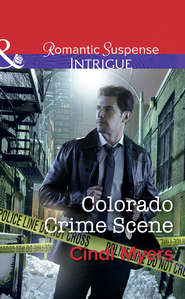По всем вопросам обращайтесь на: info@litportal.ru
(©) 2003-2025.
✖
Snowblind Justice
Автор
Год написания книги
2019
Настройки чтения
Размер шрифта
Высота строк
Поля
“Yeah,” Ryder said. “And we know that, at least a few times, Tim dressed as a woman who was trying to escape an abusive boyfriend or husband. He flagged down another woman and asked for help, then Alex moved in to attack. One woman was able to escape and described the scenario for us.”
Travis pulled on a pair of gloves, then opened the driver’s-side door. He leaned in and came out with a woman’s purse—black leather with a gold clasp. He pulled out the wallet and scanned the ID, then flipped through the credit cards until he came to a slim white card with an embossed photograph of a smiling brunette—Denise Switcher. “Looks like she worked at Colorado State University,” he said.
The hair rose on the back of Brodie’s neck. “Emily’s school,” he said. He didn’t like another connection to Emily in this case.
“Alex’s school.” Travis slid the card back into the wallet. “I wonder if he chose her because he recognized her.”
“That might have made her more likely to stop to help him out,” Dwight said.
Travis returned the wallet to the purse and rifled through the rest of the contents. Expression grim, he pulled out a white business card, the words ICE COLD in black ink printed on one side.
The card taunted them—a reminder that, yes, they knew who attacked Denise Switcher, but they weren’t any closer to catching him than they had ever been.
They were still silently contemplating the card when Travis’s phone rang. He listened for a moment, then ended the call. “That was one of the paramedics,” he said. “Denise Switcher coded before Flight for Life arrived. She’s dead.”
Brodie silently cursed the waste of a young woman’s life, as well as their best chance to learn more about Alex’s methods and motives. He turned to walk back toward the sheriff’s department vehicle, but drew up short as a red Jeep skidded to a stop inches in front of him. The driver’s door flew open and Emily stumbled out. “Is it true? Did the killer really get Denise?” she demanded, looking wildly around.
Brodie hurried to her. She wore only leggings and a thin sweater and tennis shoes, and was already shivering in the biting cold. He shrugged out of his jacket. “What are you doing here?” he asked.
She waved off his attempts to put his jacket around her. “You have to tell me. That ambulance I passed—was it Denise? Does that mean she’s still alive?”
Travis joined them. “Emily, you shouldn’t be here,” he said.
“I was in the Cake Walk Café, waiting. Then Tammy Patterson came in and said she heard from a source at the sheriff’s department that the Ice Cold Killer had attacked another woman. I had the most awful feeling it was Denise.” She bit her bottom lip, her eyes fixed on Travis, her expression pleading.
He put a hand on her shoulder. “It was Denise Switcher,” he said. “But how did you know?”
“Tammy said the woman was from Fort Collins. I was hoping that was just a coincidence, but…” She buried her face against Travis’s shoulder.
“Emily?” Brodie approached, his voice gentle. “What was Denise doing in Eagle Mountain?”
She raised her head and wiped away tears. “I’m sorry. I thought I said. She was coming to see me.”
BRODIE WORE WHAT Emily thought of as his cop face—grim determination and what felt like censure, as if he suspected her of withholding important information. She refused to give in to the temptation to cower against Travis, so she straightened and wiped the tears from her eyes.
Brodie, still scowling, thrust his jacket at her once more. “Put this on. You’re freezing.”
She would have liked nothing better than to refuse the offer, but the truth was, she was so cold she couldn’t stop shaking. She’d been so upset she had left her own coat behind at the café. She mutely accepted his jacket and slipped into it, his warmth enveloping her, along with the scent of him, clean and masculine.
“Why was Denise coming to see you?” Travis asked.
“The lead on the research project I’m involved in had some files he wanted me to review,” she said. “Denise volunteered to deliver them to me.”
“She drove six hours to deliver files?” Brodie asked. “Why didn’t they transmit them electronically? Or ask you to make the trip?”
“These are paper surveys students filled out,” she said. “And the professor had already agreed I should stay here in Eagle Mountain until after the wedding.” She hugged the coat more tightly around her. “Honestly, I don’t think he would have bothered, except Denise wanted to come. She said it was a great excuse to get out of the office and spend at least one night in the mountains.”
“The two of you were friends?” Travis asked.
She nodded, and bit the inside of her cheek to stave off the fresh wave of tears that threatened with that one change of verb tense—were. “She’s the administrative assistant in the economics department and she and I really hit it off. I’d told her so much about Eagle Mountain and the ranch that she was anxious to see it.” She swallowed hard. If Denise had stayed in Fort Collins, she’d be alive now.
“When did you talk to her last?” Travis asked.
“She called me when she stopped for gas in Gunnison, and we agreed to meet at the Cake Walk for lunch.”
“What time was that?” Brodie asked.
“About ten thirty.”
“Did Alex Woodruff know her?” Brodie asked.
Had Denise known her killer? Emily shuddered at the thought, then forced herself to focus on the question. “Maybe,” she said. “Students can register online to participate in various research studies, but they can also come into the office and fill out the paperwork there. If Alex did that, he would have met Denise. And a couple of times she’s helped check people in for studies.”
“So there’s a good chance he did know her,” Brodie said.
“Yes.” She glanced toward the gray Nissan. “What happened to her? I mean, I know she was killed, but why up here?”
“It’s possible Alex posed as a stranded motorist in need of a ride,” Travis said. “If your friend recognized him from school, do you think she would have stopped?”
Emily nodded. “Yes. Denise was always pitching in to help with fund-raisers or any extra work that needed to be done. She would have stopped to help someone, especially someone she knew.” Again, she struggled for composure. “I’m sure she has family in Denver. Someone will have to tell them.”
“I’ll take care of that,” Travis said.
She wanted to hug her brother. He had had to break the awful news to too many parents and spouses and siblings since the killings had begun. “Why is Alex doing this?” she asked.
“We’re hoping you can give us some insight into that,” Brodie said. “You might talk to some of the professors who knew him. We could call them, but they might be more inclined to open up to you. You’re one of them.”
“What is that supposed to mean?” she asked.
“You’re an academic,” he said. “You speak their language. I’m just a dumb cop.”
Under other circumstances, she might have laughed. Brodie was anything but dumb. But there was nothing funny about what had happened here today. “I’ll see what I can find out,” she said. “But I’m not promising I can help you.”
“We’d appreciate it if you’d try.” Travis patted her shoulder. “I’m sorry about your friend, but I think you’d better go home now. There’s nothing you can do here.”
She nodded, and slipped off the jacket and held it out to Brodie. “You keep it,” he said. “I can get it tonight.”
“Don’t be silly,” she said. “I’m getting back in my warm car, so I don’t need it.” And she didn’t want to give him an excuse for looking her up again later.
He took the jacket, then turned toward her Jeep, frowning. “You drove up here by yourself?” he said.
“Yes.”
“You shouldn’t be out driving by yourself,” he said. “Alex Woodruff targets women who are in their cars alone.”
“I’m not going to stop if he tries to flag me down,” she said. “I’m not stupid.”
“He knows that,” Brodie said. “He would use some subterfuge. He’s done it before.”











